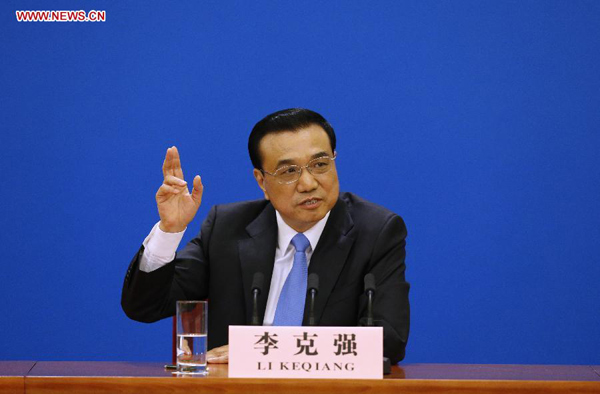

Country still has a lot of leeway to implement measures

Chinese Premier Li Keqiang speaks at a press conference after the closing meeting of the third session of China's 12th National People's Congress (NPC) at the Great Hall of the People in Beijing, capital of China, March 15, 2015. (Xinhua/Shen Bohan)
China has sufficient policy tools to keep its economy growing, Premier Li Keqiang said on Sunday, playing down concerns over slower growth in the world's second-largest economy.
As China enters a "new normal" of slower yet more balanced growth, it is "by no means easy" for the economy to meet the annualized growth target of around 7 percent set for this year, the premier said at a news conference on Sunday at the close of the annual legislative session.
A 7 percent growth in the Chinese economy, amounting to over $10 trillion, equals the economy of a medium-sized country, he said.
The 2015 growth target marks the lowest goal in 11 years for the economy, which expanded at its weakest level in 24 years in 2014.
Still, the economy is expected to perform well within a reasonable range, the premier emphasized. "If growth slows [to an extent that] it affect employment and income, closer to the lower end of the range, we will [continue efforts to] assure markets of the economy's long-term outlook, while intensifying targeted fine-tuning to assure market confidence under current economic conditions."
While we have avoided implementing short-term stimulus measures over the past few years, "it can be said that we still have a lot of leeway in implementing policy tools," the premier stated, dismissing fears of a further dip in economic activity.
The bottom end of the reasonable range refers to a minimum annual growth rate of 7 percent, below which would be intolerable, Lian Ping, the chief economist at Bank of Communications in Shanghai, told the Global Times on Sunday.
There is a possibility that economic growth might come all the way down to the lower end of the range in 2015, Lian said, citing uncertainties that may lie ahead especially in external demand and the domestic property market.
But if growth in real estate investment and home sales, a major cause of anxiety in the market, can stabilize this year, a rebound in the economy would be expected in the second half of the year rendering it possible to meet the 7 percent goal, the economist noted.
In the first two months of 2015, home sales by area contracted by 16.3 percent on a yearly basis, after having fallen 7.6 percent in the whole of 2014, according to data released by the National Bureau of Statistics (NBS) on Wednesday.
During the same period, property starts as measured by floor space shrank by 17.7 percent to 137.44 million square meters, the NBS data showed.
Expressing similar concerns over the real estate sector that has served as one of the main drags on growth, Xu Gao, the Beijing-based chief economist of China Everbright Securities, estimated that a further easing of home purchase controls are being considered to revive the property market.
Along with the transition toward a more supportive policy environment for the property market, a flurry of infrastructure projects is expected after the two sessions to help revitalize the economy that started the year on a soft note, Xu told the Global Times on Sunday.
The property market was also mentioned by the premier at Sunday's news conference, in which he stated that housing demands in China are inelastic, and a sound long-term development of the housing market will be ensured.
By introducing more pro-growth measures, it won't be a big concern for the economy to pick up steam, Xu said, adding that further cuts in either benchmark interest rates or reserve requirements would be necessary if the economy faces increasing downward pressure.
Among measures to arrest a slowdown in the economy, the central bank has implemented two interest rate cuts and one reduction in reserve requirements since November 2014, adding to a slew of targeted measures.
When asked about whether advancing reforms amid an economic slowdown would be painful, the premier acknowledged that the pain arising from reforms is still there and is becoming more acute.
"This is not nail-clipping but taking a knife [to one's own flesh]," the premier remarked, noting that vested interests will be upset with the government's continuing reforms involving streamlining of the administration and delegating government authority.
But however painful it might be, reforms being pushed by the government would not be derailed, Li further noted.
 J-11 fighters in air exercise
J-11 fighters in air exercise Beauties dancing on the rings
Beauties dancing on the rings Attendants-to-be join Mr. & Miss Campus Contest
Attendants-to-be join Mr. & Miss Campus Contest Beijing's toughest anti-smoking law takes effect
Beijing's toughest anti-smoking law takes effect Family lives in cave for about 50 years in SW China
Family lives in cave for about 50 years in SW China PLA soldiers operating vehicle-mounted guns in drill
PLA soldiers operating vehicle-mounted guns in drill Blind carpenter in E China's Jiangxi
Blind carpenter in E China's Jiangxi China hosts overseas disaster relief exercise for the first time
China hosts overseas disaster relief exercise for the first time 20 pairs of twins who will become flight attendants in Sichuan
20 pairs of twins who will become flight attendants in Sichuan Obama is sowing discontent in S.China Sea
Obama is sowing discontent in S.China Sea Rescuers work through night to reach cruise ship survivors
Rescuers work through night to reach cruise ship survivors Driving through limbo
Driving through limbo Facing down MERS
Facing down MERSDay|Week